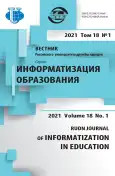State and prospects of distance learning during the COVID-19 pandemic
- Authors: Krasnova G.A.1, Polushkina A.O.1
-
Affiliations:
- Russian Presidential Academy of National Economy and Public Administration
- Issue: Vol 18, No 1 (2021)
- Pages: 36-44
- Section: DEVELOPMENT OF THE NET OF OPEN DISTANT EDUCATION
- URL: https://journal-vniispk.ru/2312-8631/article/view/321205
- DOI: https://doi.org/10.22363/2312-8631-2021-18-1-36-44
- ID: 321205
Cite item
Full Text
Abstract
Problem and goal. In Russian society, the simultaneous and mass transition to distance learning of educational organizations in March 2020 in connection with a new coronavirus infection caused a sharp discussion about the effectiveness and consequences of this format of training, as well as about the prospects for its use after the COVID-19 pandemic. In the current conditions, the education system is faced with the task of training specialists in the face of the uncertainty of the future and the accelerated digitalization of the economy. The purpose of the research is to analyze the main factors influencing the development and spread of distance learning in the coming years, as well as the possible short and long-term consequences of switching to distance learning in higher education institutions. Methodology. The analysis of the scientific literature and practical activities, as well as experienced teaching, was used in the study. Results. The content and form of education will significantly transform in the long term. Today the necessary digital competencies cannot be acquired within the framework of the traditional educational process (lectures, seminars, exams in oral form), without the systematic use of information technologies in the educational process. Information technologies will be in high demand by graduates and will allow them to be prepared for the practical use of IT in the workplace. In addition, it can significantly improve the effectiveness of training because it allows to implement an individual learning trajectory, personalize training, remove restrictions on the time and place of training, and increase the visibility and interactivity of the educational process. Conclusion. Online education, e-learning using distance learning technologies in the long term will meet the demand of students and society for training in an uncertain future. Thanks to information technologies, conditions are created for active cognitive and educational activities of students, individualization of training is provided, turning the student into an active and equal participant in the educational process, including by refusing to provide ready-made differentiated knowledge, which leads to the formation of the reproductive nature of thinking in students.
About the authors
Gulnara A. Krasnova
Russian Presidential Academy of National Economy and Public Administration
Author for correspondence.
Email: director_ido@mail.ru
Doctor of Philosophy, Full Professor, chief researcher
82 Prospekt Vernadskogo, Moscow, 119571, Russian FederationAnna O. Polushkina
Russian Presidential Academy of National Economy and Public Administration
Email: polushkina-ao@ranepa.ru
senior researcher of the Centre for Lifelong Learning Economics
82 Prospekt Vernadskogo, Moscow, 119571, Russian FederationReferences
- Bespalko VP. Slagaemye pedagogicheskoj tekhnologii [Components of pedagogical technology]. Moscow: Pedagogika Publ.; 1989. p. 30.
- International Monetary Fund. A Crisis Like No Other, An Uncertain Recovery. Available from: https://www.imf.org/ru/Publications/WEO/Issues/2020/06/24/WEOUpdateJune2020 (accessed: 20.09.2020).
- COVID-19 and the world of work. Updated estimates and analysis. Vestnik MOT. 2020;(5). (In Russ.) Available from: https://www.ilo.org/wcmsp5/groups/public/---europe/---ro-geneva/---sro-moscow/documents/briefingnote/wcms_749644.pdf (accessed: 20.09.2020).
- Anand Ch, Srinivas R. The crisis is just beginning: how to retrain those who will be left without a job]. (In Russ.) Available from: https://hbr-russia.ru/biznes-i-obshchestvo/ekonomika/834985 (accessed: 20.09.2020).
- Brown G, Ahmed A. Saving generation COVID. Available from: https://www.weforum.org/agenda/2020/07/covid19-education-lockdown-children/ (accessed: 20.09.2020).
- Tam G. 3 ways the coronavirus pandemic could reshape education. Available from: https://www.weforum.org/agenda/2020/03/3-ways-coronavirus-is-reshaping-education-and-what-changes-might-be-here-to-stay (accessed: 20.09.2020).
- Li C, Lalani F. The COVID-19 pandemic has changed education forever. Available from: https://www.weforum.org/agenda/2020/04/coronavirus-education-global-covid19-online-digital-learning (accessed: 20.09.2020).
- Marinoni G, Land H, Jensen T. The impact of Covid-19 on higher education around the world. IAU Global Survey Report. 2020.
- The World Bank. Distance learning and COVID-19. Available from: https://www.worldbank.org/en/topic/edutech/brief/edtech-covid-19 (accessed: 20.09.2020).
- Fernandes C. These 3 key factors can help reshape higher-ed after COVID-19. Available from: https://www.weforum.org/agenda/2020/07/these-3-key-factors-can-help-reshape-higher-ed-after-covid-19/ (accessed: 20.09.2020).
- The World Bank. The COVID-19 crisis response: supporting tertiary education for continuity, adaptation, and innovation. Available from: https://www.worldbank.org/en/data/interactive/2020/03/24/world-bank-education-and-covid-19 (accessed: 20.09.2020).
- Marinoni G, Land H, Jensen T. Inclusion and education: all means all. Global Education Monitoring Report. UNESCO; 2020.
- International Commission on the Futures of Education. Education in a post-COVID world: nine ideas for public action. UNESCO; 2020.
- Azimov EG, Shchukin AN. Novyj slovar' metodicheskih terminov i ponyatij (teoriya i praktika obucheniya yazykam) [New dictionary of methodological terms and concepts (theory and practice of language teaching)]. Moscow: IKAR Publ.; 2009. (In Russ.)
Supplementary files









